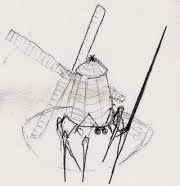Pierson's missing the point of the play, which isn't a big deal, because nearly everyone misses the play's main drive:
Its not really a play about star-crossed love.
Its a play about collateral damage.
That Mercutio, happy-go-lucky and largely harmless*, should not only die in a pointless quarrel, but one where Romeo was actually trying to play the adult, is the first ironic stroke, and is indeed, the deftest touch in the complex interplay of emotions.
Tybalt's brutal murder leading to more shame; Madame Montague dying of grief and stress; the possibility extended of things finally settling down, and then at the perfect moment, the twist of the knife! Juleit dead - the famous suicides - and the audience crowds out of the theatre, the final scene of dead and twisted bodies discovered slumped in the tomb fixed in their minds.
Shakespeare go to some effort to undercut the love story: the lovers are immature, Romeo is shown to be explicitly fickle.
Its quite the death-toll: Tybalt, Mercutio, Paris, Romeo's mother. With the exception of Tybalt, the ones that die are merely caught up in the whirlwind, and the ones that should act as brakes on the madness- Friar Lawrence and the Nurse - are astonishingly derelict in their duties, and while truly to blame for much of the destruction, escape unscathed.
And while in Othello, the destruction is caused by a clear villain, Romeo and Juleit is almost a study in murky causation. Even Tybalt's position has some justification,especially when considered in a historical light.
God, as the wit once observed, is an iron.
*Except that he is the voice of cynical rationality, and in this maelstrom of emotion, must be destroyed: there may be some connection to the film American Beauty.


No comments:
Post a Comment